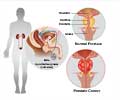Discovery of treatment-resistant prostate cancer has led to clinical trials at nine sites across the U.S.

‘Research on a gene associated with treatment-resistant prostate cancer, HSD3B1 has paved the way for the development of a new clinical trial strategy and is in clinical trials at nine sites across the U.S.
’





Advertisement
The MAVERICK Trial
The treatment in trials, called the MAVERICK Trial, is designed to block a specific protein that allows the body to produce androgens after castration. The research that fueled the treatment was published this week in the Journal of Clinical Investigation.The trial uses a drug called a tyrosine kinase inhibitor (TKI), a type of targeted therapy designed to disrupt the biological processes that power cancers. There are TKI treatments for other cancers, including leukemia and lung cancer. A goal of using more targeted treatments, like TKI, is to attack cancer while causing less damage to healthy cells.
Designing TKIs requires research on a cellular and molecular level to understand the mechanisms behind treatment-resistant cancers. Once researchers identify what’s causing treatment resistance, they can move to find a way to stop it.
“To treat a specific type of cancer, you have to understand how it works,” says Nima Sharifi, MD, Director of Cleveland Clinic Lerner Research Institute’s Genitourinary Malignancies Research Center. “It’s like figuring out how to stop a runaway car – you have to understand what is happening under the hood so you know what makes it run and how to stop it.”
Advertisement
Finding the Molecular Target
Previous research into castration-resistant prostate cancer found that tumors can make their own androgens.Dr. Sharifi’s research program previously discovered that the activation of this pathway depends on how a gene called HSD3B1 is configured. The HSD3B1 gene controls the first step in prostate cancer making these androgens.
A team in Dr. Sharifi’s lab then investigated the biological process through which prostate cancer synthesizes androgens.
Xiuxiu Li, PhD, a postdoctoral fellow in Cancer Biology and first author on the paper in JCI, focused on phosphorylation, a biological process that activates proteins or enzymes.
Dr. Li identified a tyrosine kinase called BMX that interacted with the enzyme produced by HSD3B1, was key in phosphorylation, and is required for androgens to be made.
Experiments in preclinical models then showed knocking out BMX or halting phosphorylation stopped the androgen production and cancer growth. Those findings identified BMX as the therapeutic target and created the basis for the clinical trial.
Advertisement
Genetic Testing of the Target Gene
The clinical trial, which incorporates genetic testing for the HSD3B1 gene, uses a TKI called Abivertinib.Patients who have the genetic configuration that enables adrenal androgen production will be given the TKI in combination with abiraterone acetate, a novel hormonal agent that has proven in recent trials to improve outcomes for patients with metastatic castration-resistant prostate cancer.
“If outcomes are improved for patients who take this combination – or in patients whose cancer is being treatment is still progressing after being treated with hormone-based chemotherapy alone, this could be a big step forward in caring for these patients,” says Moshe Ornstein, MD, MA, a genitourinary medical oncologist and site principal investigator at Cleveland Clinic’s clinical site. “Likewise, the lab-based translational data that will be developed from this trial will be critical to further understanding the mechanisms of resistance to abiraterone acetate and the role of Abivertinib in prostate cancer.”
The study also has potential implications for breast cancer, Dr. Sharifi says because the same process with HSD3B1 and BMX is necessary to make estrogens in postmenopausal women.
Source-Eurekalert


![Prostate Specific Antigen [PSA] & Prostate Cancer Diagnosis Prostate Specific Antigen [PSA] & Prostate Cancer Diagnosis](https://images.medindia.net/patientinfo/120_100/prostate-specific-antigen.jpg)







